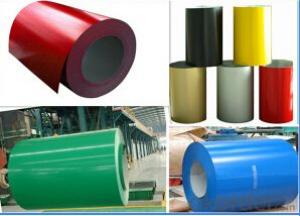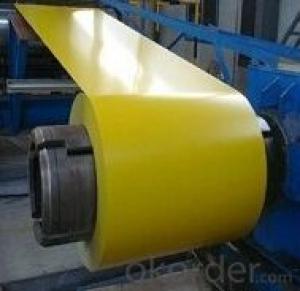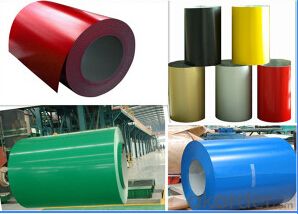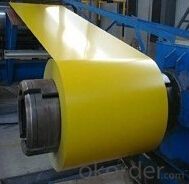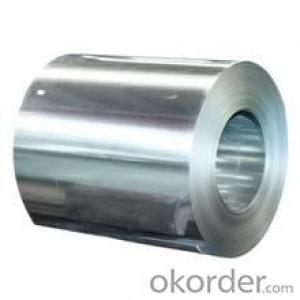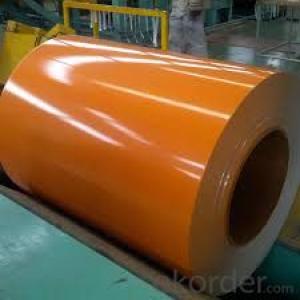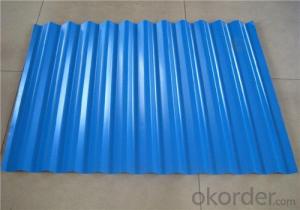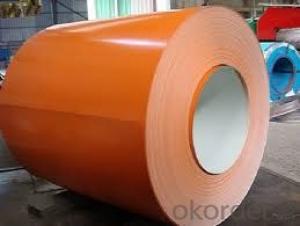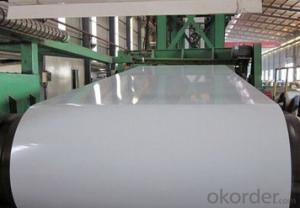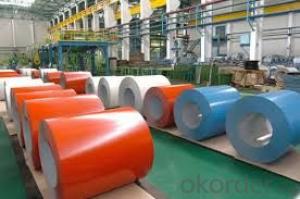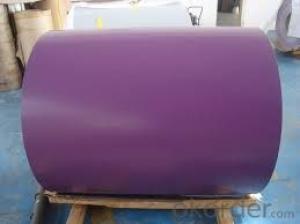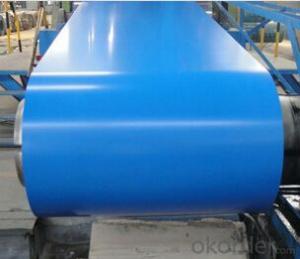PPGI Steel Coil Prepainted Galvanized Steel Coil (PPGI/PPGL)
- Loading Port:
- Tianjin
- Payment Terms:
- TT OR LC
- Min Order Qty:
- 25 m.t.
- Supply Capability:
- 10000 m.t./month
OKorder Service Pledge
OKorder Financial Service
You Might Also Like
Description
Model NO.:CGCC CGLCC
Surface Treatment:Coated
Technique:Cold Rolled
Standard:ASTM, JIS
Steel Grade:Q195
Brand:Cjcsteel
Az Coating:40g~180G/M2
Base Metal:Gi Gl
Delivery:20days
Thickness:0.14mm-1.0mm
Width:600mm-1250mm
Coating:PE
Inner Diameter of Coil:508mm 610mm
Color:Ral Color
Export Markets:Global
Additional Info.
Trademark:CJCSTEEL
Packing:Seaworth Packing
Standard:Dx51d / Dx52d/ Dx53D/ S250, 280, 320gd
Origin:China
HS Code:7210701000
Production Capacity:150, 000ton/Month
Product Description
PREPAINTED GALVANIZED STEEL SHEET IN COILS [PPGI]
SPEC: JIS G3312 CGCC
BASE METALJIS G3302, SGCC
1) Standard: JIS G3312 CGCC & CGLCC, equivalent to ASTM A755M, EN10169
2) Grade: CGCC and CGLCC
3) Hardness of material: Both soft and full hard are available
4) Surface finish: With or without protect film covered
5) Thickness range: 0.14-1.0mm
6) Width range and General width: Width range 600-1250mm, general width: 914mm, 1000mm, 1220mm and 1250mm.
7) Shape: Both sheet and coil are available
8) Zinc coating: 40-275G/M2, both sides
9) Paint thickness: Top 5 um + (10-20) um modified polyester, any RAL color code. We use Beckers paint for producing.
10) Paint thickness: Reverse 5-10 um Epoxy
11) Coil weight: 4-6 tons, also can be upon customer's requirements
12) Max loading in one 20ft container: 25 tons generally
13) MOQ: 25 tons for each thickness or color;
14) Actual shipped quantity: More or less 5%;
15) Delivery time: 2 weeks or one month generally.
16) Applications: Widely used for roof tiles, outer walls, ovens, explosive-proof steel, electrically controlled cabinets, and industrial freezers in the residential and industrial buildings.
| Name | color coated steel coil/prepainted steel coil/PPGI |
| Resin constructure Technique of production | Double painting and double baking process |
| Productivity | 150,000Tons/year |
| Thickness | 0.14-1.0mm |
| Width | 600-1250mm |
| Coil Weight | 3-8 Tons |
| Inside Diameter | 508mm Or 610mm |
| Outside Diameter | 600-1500mm |
| Zinc Coating | Z40-Z275G |
| Painting | Top: 15 to 25 um (5 um + 12-20 um) back: 7 +/- 2 um |
| Standard | DX51D/CGCC |
| SurfSurface coating coloace coating type | PE, SMP, HDP, PVDF |
| Back side coatingcolor | Light grey, white and so on |
| Application | PPGI is featured with light-weight, good looking and anticorrosion. It can be processed directly, mainly used for construction industry, home electronic apparatus industry, electronic apparatus industry, furniture industry and transportation |
FAQ
1.What's your MOQ?
25MT, it is for one container.
2.Do you have QC teams?
Yeah, sure, our QC team is very important, they will keep the quality control for our products.
3. What's your normal delivery time?
Our delivery time about 10-20days for standard sizes, if you have other requirements like hardness and width ,it is about 20-40days. But don't worry ,we also try our best for the delivery time ,because time longer and our cost is higher.
4.Are the products tested before shipping?
Yes, all of our PPGI and GI was qualified before shipping. We test every batch every day
- Q: im buying a new guitar,, it has a built in tuner and its semi acoustic (can be plugged into an amplifier) ,, im trying to choose which strings are better ,, steel or nylon..?
- i have steel and i like the way it sounds but i like nylon better
- Q: Can steel coils be used in the production of agricultural equipment?
- Yes, steel coils can be used in the production of agricultural equipment. Steel is a commonly used material in the manufacturing of agricultural machinery such as tractors, plows, harvesters, and irrigation systems. Steel coils can be formed, cut, and shaped to create various components and structures required for these equipment. The strength, durability, and corrosion resistance of steel make it suitable for withstanding the harsh conditions and heavy workloads involved in agricultural operations.
- Q: What are the safety precautions when working with steel coils?
- Some safety precautions when working with steel coils include wearing appropriate personal protective equipment (PPE) such as gloves, safety glasses, and steel-toed boots, ensuring proper lifting techniques to prevent musculoskeletal injuries, maintaining a clear and organized work area to avoid tripping hazards, using proper machinery and equipment to handle and transport the coils safely, and following established safety protocols and procedures. It is also important to receive proper training and supervision to handle steel coils effectively and minimize potential risks.
- Q: I want to design and fab a steel helmet like that in the latest Batman cartoon movie. Only problem I can foresee is staining the metal red.
- This okorder
- Q: How do steel coils contribute to the manufacturing of agricultural machinery?
- The manufacturing of agricultural machinery heavily relies on steel coils, which play a vital role in this process. Typically, these coils are crafted from top-notch steel that possesses exceptional strength, durability, and resistance to corrosion. To begin with, agricultural machinery heavily relies on steel coils for the construction of its main structural components, including the chassis, frames, and supports. These components must endure heavy loads, extreme weather conditions, and rough terrains. Thanks to the strength and resilience of steel coils, the machinery can effectively handle these challenging environments and operate efficiently. In addition, steel coils find application in the production of various moving parts and mechanisms within agricultural machinery. For example, gears, shafts, and axles, which are crucial for power transmission and rotational motion transformation, are created using steel coils. The high tensile strength and excellent machinability of steel make it an ideal material for these essential components, ensuring their reliability and longevity. Moreover, steel coils contribute to the manufacturing of agricultural machinery by providing a protective layer against wear and tear. Often, these coils are coated with specialized finishes or paints to enhance their resistance to rust, chemicals, and abrasion. This protective layer significantly prolongs the machinery's lifespan, reduces the need for frequent maintenance and repairs, and ultimately increases its overall efficiency and productivity. Furthermore, the versatility of steel coils allows for customization and adaptation to meet the specific requirements of agricultural machinery. Manufacturers can shape and mold the coils into different sizes and dimensions, enabling the production of machinery suitable for various farming practices and applications. Whether it's tractors, harvesters, or irrigation systems, steel coils are crucial for creating versatile and dependable agricultural machinery. In conclusion, steel coils are essential in the manufacturing of agricultural machinery due to their strength, durability, resistance to corrosion, and customization capabilities. From structural components to moving parts and protective coatings, steel coils greatly contribute to the efficiency, reliability, and longevity of agricultural machinery, thus providing significant support to the global agricultural industry.
- Q: What is the weight of a typical steel coil?
- The weight of a typical steel coil can vary depending on its size and thickness, but it typically ranges from a few thousand pounds to several tens of thousands of pounds.
- Q: I'm not sure.Alloy stainless steel 308 series.
- No. People have been cooking on stainless steel for years.
- Q: What are the different methods of forming steel coils?
- There are several methods used for forming steel coils, depending on the specific requirements and applications. These methods include hot rolling, cold rolling, and continuous casting. Hot rolling is the most common method used for forming steel coils. It involves heating the steel billet or ingot to high temperatures and then passing it between a series of rollers to reduce its thickness and shape it into a coil. This process is typically performed above the recrystallization temperature of the steel, which allows for better shaping and improved mechanical properties. Cold rolling, on the other hand, is a process that is performed at or near room temperature. It involves passing the steel through a series of rollers to reduce its thickness and shape it into a coil. Cold rolling is often employed to produce steel coils with precise dimensions and excellent surface finish. It can also increase the strength and hardness of the steel. Continuous casting is another method used for forming steel coils. It involves pouring molten steel into a continuous casting machine, where it is solidified into a strand. The strand is then continuously fed into a series of rollers, which shape it into a coil. Continuous casting offers several advantages, such as improved efficiency, reduced energy consumption, and better control over the steel's composition and quality. In addition to these primary methods, there are various secondary processes involved in forming steel coils. These include pickling, annealing, and coating. Pickling removes any rust or scale from the surface of the steel, ensuring a clean and smooth finish. Annealing involves heating the steel to a specific temperature and then slowly cooling it, which helps to improve its ductility and reduce internal stresses. Coating is often applied to steel coils to provide corrosion resistance or enhance its aesthetic appeal. In summary, the different methods of forming steel coils include hot rolling, cold rolling, and continuous casting. Each method offers unique advantages and is chosen based on the specific requirements of the steel product. Additionally, secondary processes such as pickling, annealing, and coating are often employed to further enhance the quality and performance of the steel coils.
- Q: What are the dimensions of steel coils used in the energy sector?
- The dimensions of steel coils utilized in the energy sector may differ depending on the specific application and requirements. However, typical dimensions for steel coils in the energy sector encompass a thickness range of 0.5mm to 5.0mm, with widths that usually span from 600mm to 2000mm. The diameter of the coil can also vary, with commonly employed sizes ranging from 1000mm to 2200mm. These dimensions are carefully selected to ensure that the coils can be easily transported, processed, and employed in various energy sector applications, such as power plants, oil and gas pipelines, and renewable energy projects. It is important to emphasize that these dimensions are not fixed and can be tailored according to specific project requirements.
- Q: Where can a find a steel scrubber. Its great to clean cooking vessels. Would be great if someone gives me an idea. I did not find it at CVS, but was in a hurry, will try again tomorrow.
- I posted this earlier to a similar question... Really burnt on gunk in the bottom like milk or blackened food can easily be cleaned out of stainless steel pots and pans by sprinkling baking soda in the bottom, covering with vinegar, let simmer with a little water for 5 min. Let cool, scrub out with a vinyl scrubby. or I use a lot of stainless steel for cooking and over the years have found a very inexpensive solution to cleaning them especially the ones with burnt food stuck at the bottom. I use Used fabric softner sheets (sheets that i have already used in the dryer for my clothes) and have them soak in water in the dirty pan overnight. Next morning i use the same sheet as scrubber to clean the pan and all the burnt food comes off easily leaving a new look to the pan. Try it this works.
Send your message to us
PPGI Steel Coil Prepainted Galvanized Steel Coil (PPGI/PPGL)
- Loading Port:
- Tianjin
- Payment Terms:
- TT OR LC
- Min Order Qty:
- 25 m.t.
- Supply Capability:
- 10000 m.t./month
OKorder Service Pledge
OKorder Financial Service
Similar products
Hot products
Hot Searches
Related keywords
